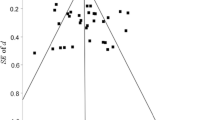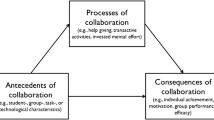Abstract
Interest in collaborative concept mapping studies has grown steadily over the years. However, insufficient studies compare collaborative concept mapping with other similarly robust collaborative activities. Another limitation is that existing collaborative concept mapping studies seldom elaborate on the extent of participants’ interactions with each other. To address these limitations, this study uses a 2 × 2 factorial design in which collaborative activity (concept mapping vs. summary writing) was crossed with resource distribution (interdependence vs. independence). Participants (n = 428) were assigned to dyads, and the 214 dyads were randomly assigned to one of four conditions. The dependent measures were immediate and delayed retention and transfer, and cognitive load. Results indicated a significant main effect for resource distribution for immediate recall. However, no other significant effects were obtained indicating that the conditions yielded comparable learning outcomes. Theoretical, empirical, and practical implications of the results are discussed, and future research directions are presented.


Similar content being viewed by others
References
Adesope, O., & Nesbit, J. C. (2010). A systematic review of research on collaborative learning with concept maps. In P. Lupion Torres & R. de Cássia Veiga Marriott (Eds.), Handbook of research on collaborative learning using concept mapping. IGI Global.
Adesope, O. O., & Nesbit, J. C. (2013). Animated and static concept maps enhance learning from spoken narration. Learning and Instruction, 27, 1–10. https://doi.org/10.1016/j.learninstruc.2013.02.002
Aguinis, H., Gottfredson, R. K., & Joo, H. (2013). Best-practice recommendations for defining. https://doi.org/10.1016/j.learninstruc.2013.02.002
Ayres, P., & Sweller, J. (2014). The split-attention principle in multimedia learning. In R. Mayer (Ed.), The Cambridge Handbook of Multimedia Learning (Cambridge Handbooks in Psychology, pp. 206–226). Cambridge: Cambridge University Press. https://doi.org/10.1017/CBO9781139547369.011
Basque, J., & Lavoie, M. C. (2006). Collaborative concept mapping in education: Major research trends. In: A. J. Cañas, & J. D. Novak JD (Eds.), Proceedings of the second international conference on concept mapping(p. 79–86). Universidad de Costa Rica.
Buchs, C., & Butera, F. (2009). Is a partner’s competence threatening during dyadic cooperative work? It depends on resource interdependence. European Journal of Psychology of Education, 24(2), 145–154. https://doi.org/10.1007/BF03173007
Buchs, C., Butera, F., & Mugny, G. (2004). Resource interdependence, student interactions and performance in cooperative learning. Educational Psychology, 24(3), 291–314. https://doi.org/10.1080/0144341042000211661
Cañas, A. J., Coffey, J. W., Carnot, M. J., Feltovich, P., & Hoffman, R. R. (2003). A summary of literature pertaining to the use of concept mapping techniques and technologies for education and performance support. The Institute for Human and Machine Cognition.
Chang, C.-C., Liu, G.-Y., Chen, K.-J., Huang, C.-H., Lai, Y.-M., & Yeh, T.-K. (2017). The effects of a collaborative computer-based concept mapping strategy on geographic science performance in junior high school students. Eurasia Journal of Mathematics, Science, Technology Education, 13(8), 5049–5060. https://doi.org/10.12973/eurasia.2017.00981a
Chang, K. E., Sung, Y. T., & Chen, S. F. (2001). Learning through computer-based concept mapping with scaffolding aid. Journal of Computer Assisted Learning, 17(1), 21–33. https://doi.org/10.1111/j.1365-2729.2001.00156.x
Chi, M. T. H., & Wylie, R. (2014). The ICAP framework: Linking cognitive engagement to active learning outcomes. Educational Psychology, 49(4), 219–243. https://doi.org/10.1080/00461520.2014.965823
Cohen, J., Cohen, J., West, S. G., & Aiken, L. S. (Eds.). (2003). Applied multiple regression/correlation analysis for the behavioral sciences (3rd ed.). L Erlbaum Associates.
Dillenbourg, P. (1999). What do you mean by collaborative learning? In P. Dillenbourg (Ed.), Collaborative-learning: Cognitive and computational approaches (pp. 1–19). Elsevier.
Fechner, S. (2009). Effects of context-oriented learning on student interest and achievement in chemistry education. Logos-Verl.
Fiorella, L., & Mayer, R. E. (2016). Eight ways to promote generative learning. Educational Psychology Review, 28(4), 717–741. https://doi.org/10.1007/s10648-015-9348-9
Fischer, F., Bruhn, J., Gräsel, C., & Mandl, H. (2002). Fostering collaborative knowledge construction with visualization tools. Learning and Instruction, 12(2), 213–232. https://doi.org/10.1016/S0959-4752(01)00005-6
Gao, H., Shen, E., Losh, S., & Turner, J. (2007). A review of studies on collaborative concept mapping: What have we learned about the technique and what is next. Journal of Interactive Learning Research, 18(4), 479–492.
Haugwitz, M., Nesbit, J. C., & Sandmann, A. (2010). Cognitive ability and the instructional efficacy of collaborative concept mapping. Learning and Individual Differences, 20(5), 536–543. https://doi.org/10.1016/j.lindif.2010.04.004
Holm, S. (1979). A simple sequentially rejective multiple test procedure. Scandinavian Journal of Statistics, 6(2), 65–70. http://www.jstor.org/stable/4615733
Janssen, J., Erkens, G., Kirschner, P. A., & Kanselaar, G. (2010). Effects of representational guidance during computer-supported collaborative learning. Instructional Science, 38(1), 59–88. https://doi.org/10.1007/s11251-008-9078-1
Javonillo, R., & Martin-Dunlop, C. (2019). Linking phrases for concept mapping in introductory college biology. Journal of College Biology Teaching, 45(3), 34–38.
Johnson, D. W., & Johnson, R. T. (2009). An educational psychology success story: Social interdependence theory and cooperative learning. Educational Researcher, 38(5), 365–379. https://doi.org/10.3102/0013189X09339057
Johnson, D. W., Johnson, R. T., Ortiz, A. E., & Stanne, M. (1991). The impact of positive goal and resource interdependence on achievement, interaction, and attitudes. The Journal of General Psychology, 118(4), 341–347. https://doi.org/10.1080/00221309.1991.9917795
Johnson, D. W., Johnson, R. T., & Stanne, M. B. (1989). Impact of goal and resource interdependence on problem-solving success. Journal of Social Psychology, 129(5), 621–629. https://doi.org/10.1080/00224545.1989.9713780
Jonassen, D. H., Reeves, T. C., Hong, N., Harvey, D., & Peters, K. (1997). Concept mapping as cognitive learning and assessment tools. Journal of Interactive Learning Research, 8(3/4), 289–308.
Kirschner, F., Paas, F., & Kirschner, P. A. (2009). Individual and group-based learning from complex cognitive tasks: Effects on retention and transfer efficiency. Computers in Human Behavior, 25(2), 306–314. https://doi.org/10.1016/j.chb.2008.12.008
Kirschner, F., Paas, F., & Kirschner, P. A. (2011). Task complexity as a driver for collaborative learning efficiency: The collective working-memory effect. Applied Cognitive Psychology, 25(4), 615–624. https://doi.org/10.1002/acp.1730
Kirschner, P. A., Beers, P. J., Boshuizen, H. P. A., & Gijselaers, W. H. (2008). Coercing shared knowledge in collaborative learning environments. Computers in Human Behavior, 24(2), 403–420. https://doi.org/10.1016/j.chb.2007.01.028
Kirschner, P. A., Sweller, J., Kirschner, F., & Zambrano, R. J. (2018). From cognitive load theory to collaborative cognitive load theory. International Journal of Computer Supported Collaborative Learning, 13(2), 213–233. https://doi.org/10.1007/s11412-018-9277-y
Kwak, S. K., & Kim, J. H. (2017). Statistical data preparation: Management of missing values and outliers. Korean Journal of Anesthesiology, 70(4), 407. https://doi.org/10.4097/kjae.2017.70.4.407
Kwon, S. Y., & Cifuentes, L. (2009). The comparative effect of individually-constructed vs. Collaboratively-constructed computer-based concept maps. Computers & Education, 52(2), 365–375. https://doi.org/10.1016/j.compedu.2008.09.012
Lambiotte, J. G., Skaggs, L. P., & Dansereau, D. F. (1993). Learning from lectures: Effects of knowledge maps and cooperative review strategies. Applied Cognitive Psychology, 7(6), 483–497. https://doi.org/10.1002/acp.2350070604
Lin, Y. T., Chang, C. H., Hou, H. T., & Wu, K. C. (2016). Exploring the effects of employing Google Docs in collaborative concept mapping on achievement, concept representation, and attitudes. Interactive Learning Environments, 24(7), 1552–1573. https://doi.org/10.1080/10494820.2015.1041398
Molinari, G., Sangin, M., Dillenbourg, P., & Nüssli, M.-A. (2009). Knowledge interdependence with the partner, accuracy of mutual knowledge model and computer-supported collaborative learning. European Journal of Psychology of Education, 24(2), 129–144. https://doi.org/10.1007/BF03173006
Nesbit, J. C., & Adesope, O. O. (2006). Learning with concept and knowledge maps: A meta-analysis. Review of Educational Research, 76(3), 413–448. https://doi.org/10.3102/00346543076003413
Novak, J. D. (1995a). Concept mapping: a strategy for organizing knowledge. In Learning science in the schools: Research reforming practice, pp. 229–245. Lawrence Erlbaum Associates.
Novak, J.D., Cañas, A.J. (2010). The universality and ubiquitousness of concept maps. In J. Sánchez, A. J. Cañas, & J. D. Novak (Eds.)’ Proceedings of the fourth international conference on concept mapping (Volume 1, pp. 1–13). Universidad de Chile.
Novak, J. D. (1995b). Concept mapping to facilitate teaching and learning. Prospects, 25(1), 79–86.
Okebukola, P. A., & Jegede, O. J. (1988). Cognitive preference and learning mode as determinants of meaningful learning through concept mapping. Science Education, 72(4), 489–500. https://doi.org/10.1002/sce.3730720408
Paas, F. (1992). Training strategies for attaining transfer of problem-solving skill in statistics: A cognitive load approach. Journal of Educational Psychology, 84(4), 429–434. https://doi.org/10.1037/0022-0663.84.4.429
Rewey, K. L., Dansereau, D. F., Dees, S. M., Skaggs, L. P., & Pitra, U. (1992). Scripted cooperation and knowledge map supplements: Effects on the recall of biological and statistical information. Journal of Experimental Education, 60(2), 92–107. https://doi.org/10.1080/00220973.1991.10806582
Riahi, Z., & Pourdana, N. (2017). Effective reading comprehension in EFL contexts: individual and collaborative concept mapping strategies. Advance in Language and Literary Studies, 8(1), 51. https://doi.org/10.7575/aiac.alls.v.8n.1p.51
Roth, W.-M., & Roychoudhury, A. (1993). The concept map as a tool for the collaborative construction of knowledge: A microanalysis of high school physics students. Journal of Research in Science Teaching, 30(5), 503–534. https://doi.org/10.1002/tea.3660300508
Royer, R., & Royer, J. (2004). Comparing hand drawn and computer generated concept mapping. Journal of Computing in Mathematics and Science Teaching, 23(1), 67–81.
Sarfo, F. K., & Elen, J. (2017). Investigating the impact of positive resource interdependence and individual accountability on students’ academic performance in cooperative learning. Electronic Journal of Research in Educational Psychology, 9(23). https://doi.org/10.25115/ejrep.v9i23.1428
Schroeder, N. L., Nesbit, J. C., Anguiano, C. J., & Adesope, O. O. (2018). Studying and constructing concept maps: A meta-analysis. Educational Psychology Review, 30(1), 432–455. https://doi.org/10.1007/s10648-017-9403-9
Simone, C. D., Schmid, R. F., & McEwen, L. A. (2001). Supporting the learning process with collaborative concept mapping using computer-based communication tools and processes. Educational Research and Evaluation, 7(2–3), 263–283. https://doi.org/10.1076/edre.7.2.263.3870
Stoyanova, N., & Kommers, P. (2002). Concept mapping as a medium of shared cognition in computer-supported collaborative problem solving. Journal of Interactive Learning Research, 13(1), 111–133.
Suthers, D. D., & Hundhausen, C. D. (2003). An experimental study of the effects of representational guidance on collaborative learning processes. The Journal of the Learning Sciences, 12(2), 183–218. https://doi.org/10.1207/S15327809JLS1202_2
Tabachnick, B. G., & Fidell, L. S. (2013). Using multivariate statistics (6th ed.). Pearson Education.
Talbert, L. E., Bonner, J., Mortezaei, K., Guregyan, C., Henbest, G., & Eichler, J. F. (2020). Revisiting the use of concept maps in a large enrollment general chemistry course: Implementation and assessment. Chemical Education Research and Practice, 21(1), 37–50. https://doi.org/10.1039/C9RP00059C
van Boxtel, C., van der Linden, J., & Kanselaar, G. (1997). Collaborative construction of conceptual understanding-interaction processes and learning outcomes emerging from a concept mapping and a poster task.pdf. Journal of Interactive Learning Research, 8(3–4), 341–361.
van Boxtel, C., van der Linden, J., Roelofs, E., & Erkens, G. (2002). Collaborative concept mapping: Provoking and supporting meaningful discourse. Theory Into Practice, 41(1), 40–46. https://doi.org/10.1207/s15430421tip4101_7
Webb, N. M. (2009). The teacher’s role in promoting collaborative dialogue in the classroom. British Journal of Educational Psychology, 79(1), 1–28. https://doi.org/10.1348/000709908X380772
Author information
Authors and Affiliations
Corresponding author
Additional information
Publisher's Note
Springer Nature remains neutral with regard to jurisdictional claims in published maps and institutional affiliations.
Supplementary Information
Below is the link to the electronic supplementary material.
Rights and permissions
Springer Nature or its licensor (e.g. a society or other partner) holds exclusive rights to this article under a publishing agreement with the author(s) or other rightsholder(s); author self-archiving of the accepted manuscript version of this article is solely governed by the terms of such publishing agreement and applicable law.
About this article
Cite this article
Wong, R.M., Adesope, O.O. Promoting collaboration through resource interdependence to enhance collaborative concept mapping. Soc Psychol Educ 27, 89–113 (2024). https://doi.org/10.1007/s11218-023-09830-x
Received:
Accepted:
Published:
Issue Date:
DOI: https://doi.org/10.1007/s11218-023-09830-x




